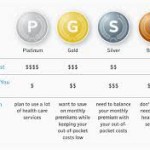Summary: What are metal plans? What distinguishes one from another? When do they go into effect?
Summary: What are metal plans? What distinguishes one from another? When do they go into effect?
Metal plans are the levels of plans that will be included in the health insurance exchanges. Health insurance exchanges are basically marketplaces designing for purchasing insurance. They are called metal plans because each level is a different metal: platinum, gold, silver, and bronze and were created as a result of the Affordable Care Act. The idea for the metal plans originated in Massachusetts.
Open enrollment for the exchanges begins October 1, 2013 and coverage will be effective January 1, 2014. While each metal plan offers the same essential benefits, they will vary based upon premiums and out of pocket expenses. Out of pocket expenses include deductibles, copayments and coinsurance.
All health plans in the exchanges are required to provide a minimum set of benefits which are termed essential benefits. These benefits include:
- Ambulatory patient services
- Emergency services
- Hospitalization
- Maternity and newborn care
- Mental health services
- Substance use disorder services
- Prescription drug coverage
- Rehabilitative and habilitative services and devices
- Preventative and wellness services
- Pediatric Services
Metal plans
Platinum
- Lowest out of pocket for enrollees – approximately 10%
- Highest premiums
Gold
- Out of pocket expenses – approximately 20%
- Must be offered by an insurance company in order to participate in the exchanges
Silver
- Out of pocket expenses – approximately 30%
- Must be offered by an insurance company in order to participate in the exchanges
- The standard plan in terms of tax credit eligibility
Bronze
- Highest out of pocket expenses – approximately 40%
- Lowest premiums
Within each of the different levels, premiums will vary depending upon which company insurance is purchased through. This is where the term
Plans are beginning to release their premium schedules. They will vary from state to state. More detailed information will be released over the coming months so it will be important to remain current on the exchanges for your individual state.

